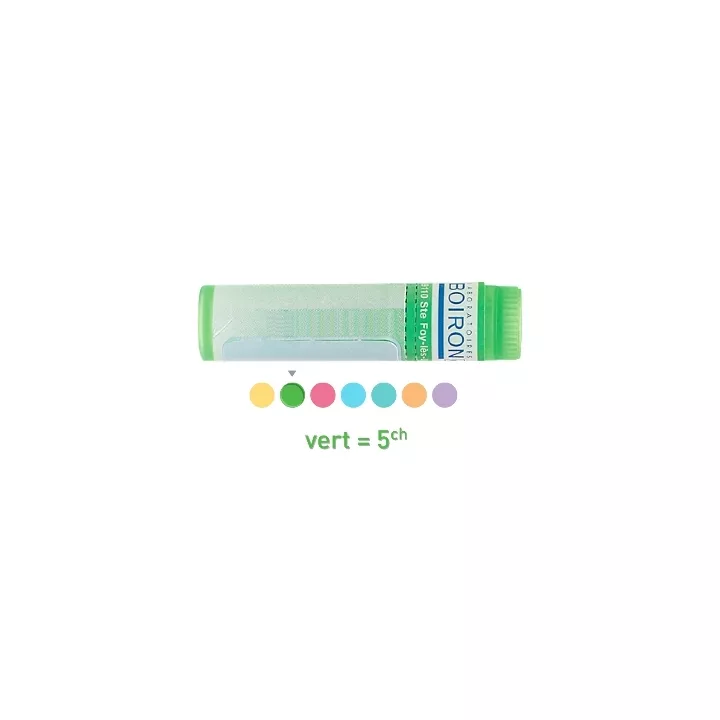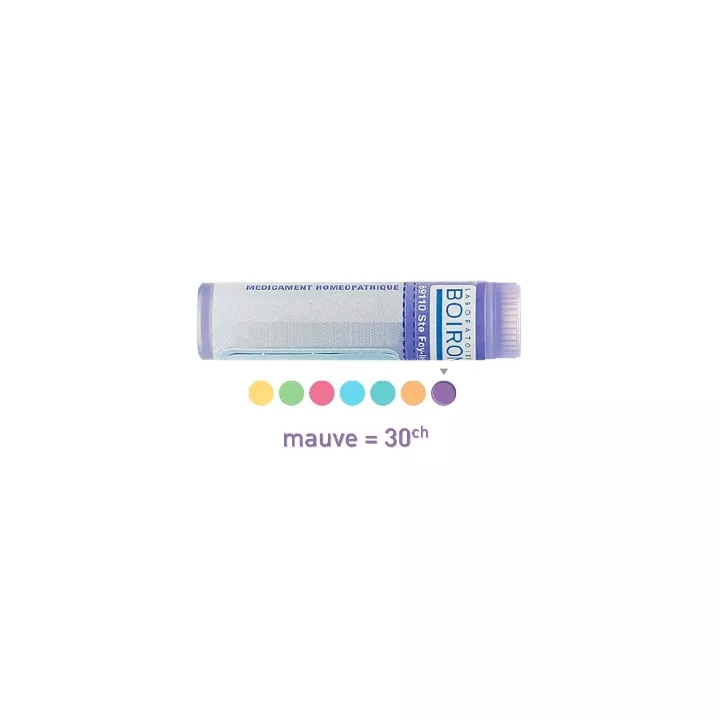Carbo vegetabilis 5CH, 7CH, 9CH, 12CH, 15CH, 30CH homeopathy monodose Boiron
Carbo Vegetabilis for the Relief of Digestive Disorders
Carbo Vegetabilis is a homeopathic remedy used to relieve digestive disorders such as gastroenteritis, diarrhea and turista. While it may offer relief for these conditions, it's essential to consult a homeopathic healthcare professional for personalized treatment tailored to your condition. Take care of your digestive well-being with Carbo Vegetabilis.
French name: CHARBON VEGETAL OFFICINAL
Registered medicine: EH00434
Origin : Vegetable
Carbo Vegetabilis is a homeopathic remedy used to treat certain types of gastroenteritis. It also acts as an antiseptic when prescribed as a treatment for bedsores and skin disorders. In pneumology, it is frequently combined with allopathic vasodilator treatments to enable patients to breathe more easily. In cardiology, it enhances blood purification to prevent cyanosis.
Indications and dosage
Homeopathic medicines in globular doses can be used for a variety of symptoms, so it is not possible to determine the indications and dosage of a specific preparation.
The homeopathic physician selects the appropriate medicine, dilution and dosage according to the patient's state of health and characteristic symptoms.
Carbo Vegetabilis: a homeopathic remedy for digestive disorders
Carbo Vegetabilis is a homeopathic remedy traditionally used to treat digestive disorders such as gastroenteritis, diarrhea and turista. In this article, we'll explore the common uses of this homeopathic remedy to relieve these digestive system ailments.
Gastroenteritis: Relieving digestive discomfort
Gastroenteritis, characterized by symptoms such as nausea, vomiting, diarrhea and abdominal cramps, can be very uncomfortable. Carbo Vegetabilis is often recommended in homeopathy to help relieve these symptoms. It is valued for its potential to soothe irritated stomachs and reduce digestive disorders.
Diarrhoea: Restoring intestinal balance
Frequent diarrhea, particularly that accompanied by loose stools and abdominal cramps, can lead to dehydration and weakness. Carbo Vegetabilis is used in homeopathy to help restore intestinal balance. It is renowned for its gentle action on the digestive system, promoting faster recovery.
Turista: Prevention and treatment of intestinal disorders when traveling
Turista, or traveler's diarrhea, is a common ailment among those who travel to areas where food or water may be contaminated. Carbo Vegetabilis is sometimes recommended in homeopathy to prevent or treat travel-related intestinal disorders. It is considered for its soothing action on the digestive system, which can help minimize the risk of turista.
Directions for use
Remove tab, invert tube and pull cap slightly.
Place all the globules in the dose under the tongue.
Do not touch the homeopathic globules with your fingers.
The globules in the dose tubes are absorbed in one go, dissolving slowly under the tongue. If no dose is available, take 10 globules of the same dilution.
Do not take astringent substances such as coffee, tobacco, camphor, mint or chamomile within half an hour of taking homeopathic medicines.
Use a mint-free toothpaste (such as Homéodent Boiron).
Professional consultation: the key to appropriate use
As with any homeopathic remedy, it's essential to consult a homeopathic health care professional to determine the right medicine, dilution and dosage for your condition and symptoms. Each case is unique, and a qualified practitioner will be able to tailor the treatment to your individual needs.
Packaging and contents
Single-dose tube with translucent globules (for visualization of remaining globules).
Each tube color corresponds to a dilution
yellow 4CH green 5CH red 7CH blue 9 CH water green 12CH orange 15CH mauve 30CH
Weight 1g.
Precautions for use
Warning
Contains sacchararose.
Store homeopathic medicines away from light, heat, moisture, fumes and fragrances.
Giving homeopathic globules to babies and children
For globules or alcoholic drops, dissolve in 100ml of water. As globules take a very long time to dissolve, you'll need to prepare your mixture in advance.
Homeopathy and pregnancy
Homeopathic remedies have no chemical toxicity, no contraindications, no interaction with other drugs, and no adverse effects linked to the quantity of product ingested. Pregnant women can take homeopathic remedies without any known risk to themselves or their unborn child, but it's best to ask for advice.
Frequency of homeopathic use
For acute conditions, homeopathic remedies should be taken every hour until symptoms improve. From then on, they should be taken 3 or 4 times a day, spaced out, and then gradually stopped.
For chronic conditions, low-dilution remedies (> 9CH) should be taken 1 or 2 times a day, while basic remedies should be taken once a week, or even once a month. This decision is left to the homeopath.
What to do if there is no improvement within 24 hours
Certain pathologies cannot be treated with homeopathy simply by self-medication. Their seriousness requires medical advice, which can be given by a homeopathic doctor. This doctor will judge whether your condition can be treated with homeopathy alone, or whether your treatment needs to be supplemented with allopathic medicine.





















